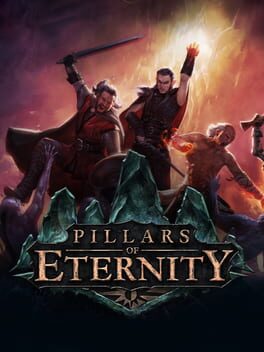What a fucking game, my dudes and duderinas. I played Pillars of Eternity when it came out way back in 2015 and while I loved it then, I think I still didn't quite get it. The game throws a ton of lore and setting exposition right at the very beginning and it never lets up, which made it difficult, for me anyway, to connect with the setting. However, deeper into the game things do start to fall in place, and as a setting, Eora is incredibly rich not only in history, cultural diversity, and storytelling, but in its ideas and prose as well. Every character the player will meet in Pillars of Eternity comes with his or her own set of flaws, ambitions, and perspective of the world around them that are grounded in the same storytelling and universe that the player experiences, and while they do have realism woven into their personalities, the character writing is more literary mythic than anything else. Eora and its denizens are heavily steeped in historical context within the game-world as well as within the philosophical context of their real world inspirations. Memory, history, and reconciliation of past and present are ever-present throughout the game's narrative and companions.
While the dense writing and lore may cause a barrier to entry on the writing side, Pillars of Eternity's combat and RPG systems are wonderfully CRPG beginner friendly. Every attribute is meaningful and can contribute to any build which makes it difficult to brick a character, allowing for roleplay to take precedence across builds. Obviously, as with any CRPG, min-maxing optimization can occur if a player desires to powergame, but the system does not punish more casual players, resulting in a positive experience for both ends of the spectrum. I played a rogue who wore heavy plate armor and used a gun, but the standard light-armored sneaky rogue would work just as well, for example.
However, the real highlights of Pillars of Eternity happen when the game turns all of this worldbuilding on its head and finally considers the implications of the ideas it sets forth. Themes of post-colonialism, ontology, historical relevance, nihilism, and imperial exceptionalism all are not only represented within the game, but are confronted directly by the player. It's not enough just to represent these ideas within the game world - the player is specifically tasked to think about philosophical questions in order to progress through conversations and form plans on how to move forward.
Few games seem to do this as openly and bluntly as Pillars of Eternity does, and while the game may have originally existed as a kickstarter project meant to placate fans, like myself, of Baldur's Gate, narratively Pillars of Eternity is much more in line with something like Planescape: Torment or Bethesda's post-modernist take on fantasy lore via Morrowind. Like all celebrated and dissected mythologies, Eora isn't afraid to get both historical and weird in order to confront our idea of humanity and the world we live in.
While the dense writing and lore may cause a barrier to entry on the writing side, Pillars of Eternity's combat and RPG systems are wonderfully CRPG beginner friendly. Every attribute is meaningful and can contribute to any build which makes it difficult to brick a character, allowing for roleplay to take precedence across builds. Obviously, as with any CRPG, min-maxing optimization can occur if a player desires to powergame, but the system does not punish more casual players, resulting in a positive experience for both ends of the spectrum. I played a rogue who wore heavy plate armor and used a gun, but the standard light-armored sneaky rogue would work just as well, for example.
However, the real highlights of Pillars of Eternity happen when the game turns all of this worldbuilding on its head and finally considers the implications of the ideas it sets forth. Themes of post-colonialism, ontology, historical relevance, nihilism, and imperial exceptionalism all are not only represented within the game, but are confronted directly by the player. It's not enough just to represent these ideas within the game world - the player is specifically tasked to think about philosophical questions in order to progress through conversations and form plans on how to move forward.
Few games seem to do this as openly and bluntly as Pillars of Eternity does, and while the game may have originally existed as a kickstarter project meant to placate fans, like myself, of Baldur's Gate, narratively Pillars of Eternity is much more in line with something like Planescape: Torment or Bethesda's post-modernist take on fantasy lore via Morrowind. Like all celebrated and dissected mythologies, Eora isn't afraid to get both historical and weird in order to confront our idea of humanity and the world we live in.

MaiaCustom
2 months ago